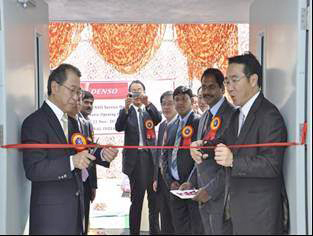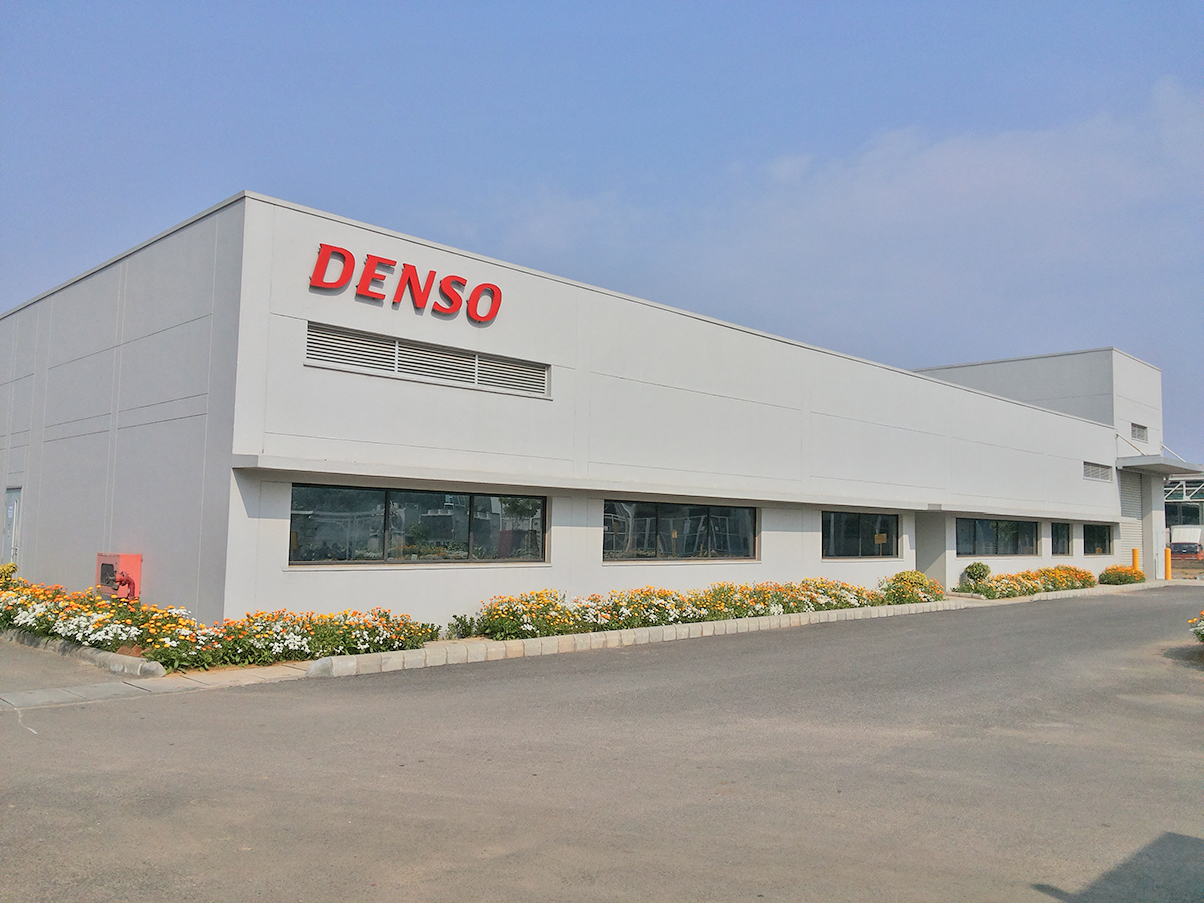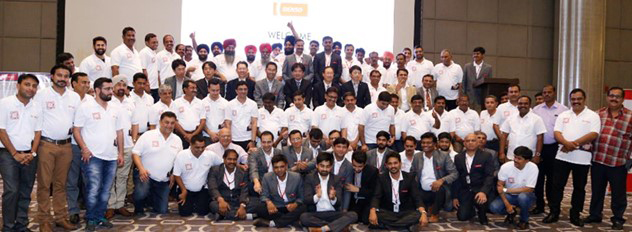2. DIIN Shift from Sales Company to multi-functional Regional HQ - “Collaboration” & “Adaptability”.
[4] Strengthen of Aftermarket, Establishment of India Service Centre, and setup of CQE & QC Department to support IGCs
Aftermarket
In the early stages of DENSO's venture into the Indian automotive landscape in 1990, the company laid the foundation for its Aftermarket (AM) domain. With three Territory Managers (TMs) stationed at the SRF-ND plant (now DNIN, Noida), DENSO commenced sales of AM products through an Authorized Sales Dealer (ASD) in Delhi, catering to Maruti, Hindustan Motors, and Premier Automobiles. The AM product range encompassed Alternators, Starter Motors, Wiper Motors & Links, and Radiator Fan Assemblies.
As the years progressed, the AM Sales team expanded its footprint, reaching key cities like Pune, Chennai, Kolkata, and Cochin. The Aftermarket Sales Dealer ASD network proliferated nationwide, serving as the backbone for sales to Maruti dealer networks. A pivotal moment in 2004 marked the initiation of Bus Air Conditioning (AC) business with Volvo as an import product.
By 2005, DENSO achieved a remarkable milestone, crossing Rs. 10 million in annual AM sales. The succeeding years witnessed an expansion of the AM product range to include Spark Plugs, Filters, Micro Relays, Horns, and more, further solidifying DENSO's position in the aftermarket.
However, the year 2012 brought a change in direction. The introduction of the Maruti Dealer Management System (DMS) prompted DENSO to cease AM product sales to the Maruti Dealer network, shifting the focus exclusively to the ASD network. Simultaneously, the Bus AC business faced challenges with competitors entering the city bus segment.
In 2017, DIIN launched and stepped into service activities for DOKO, a 2-wheeler security system. Recognizing the need for effective communication, DIIN created installation instruction videos to address the language barriers faced by Indian mechanics.
The year 2020 marked a significant milestone with the collaboration between DIIN AM and TASL (Mitsubishi partner), India's leading AM player. This strategic alliance aimed to leverage TASL's extensive network for AM sales expansion. Embracing the changing environment due to the Covid pandemic, DIIN initiated the development of an E-Commerce App with TASL, tapping into its vast retailer and workshop network.
As of 2022, sales through TASL's E-Commerce network have commenced, showcasing DENSO's adaptability to evolving market dynamics. To further diversify, DENSO AM initiated the feasibility study of DENSO WAVE (DNWA) QR code as a solution for non-automotive businesses.
The evolution of DENSO's Aftermarket journey reflects its agility in responding to market shifts and embracing innovative solutions for sustained growth.
Customer Service


Establishment of India Service Centre for Technical Training
In 2004, DENSO India embarked on a transformative journey, transitioning from its conventional EE product range to introducing cutting-edge products like CRS for Toyota. The venture aimed at meeting heightened customer expectations, necessitating the establishment of a robust network, minimizing warranty costs, and providing crucial diagnosis support to dealers. Through strategic initiatives such as the Service Dealer network, on-site Gemba activities, and relentless countermeasures, DENSO successfully carved a niche for CRS within the Indian automotive landscape.


The year 2012 marked a pivotal moment with the inauguration of the DENSO Service Centre. Designed to be a hub of technical expertise, this center became instrumental in developing training programs for CRS dealers, ranging from Basic to Expert courses. Furthermore, a groundbreaking Injector repair & return program was introduced in 2014, emphasizing cost-effective solutions.
Expanding its horizon in 2012, DENSO delved into the Common Rail System (CRS) business expansion, forging alliances with local OEMs such as Ashok Leyland, VECV, John Deere, and Cummins. This venture was not without challenges, as DENSO aimed to impart knowledge about CRS to OEMs unfamiliar with the technology. The strategy involved skill enhancement for DENSO Service Dealers, low-cost injector repairs, and the development of diagnostic tools.
In 2017, DENSO tackled the dilemma of network expansion and market competitiveness by localizing its operations. Embracing the 'Make in India' initiative, DENSO developed a low-cost Injector repair test bench, special tools, and diagnostic equipment, expanding the Injector repair network to 45 locations. This endeavor not only strengthened DENSO's foothold in the Indian market but also facilitated the export of Indian-made Injector Test Benches to various OGCs.
Fast forward to 2021, DENSO embarked on a new frontier with the 'Service as a Business' initiative under the Reborn 21 project. This innovative approach aimed to provide new value, contributing to global goals of Carbon Neutrality and Circular Economy. The projects under this initiative included Telematics solutions for Fleet business, upgrading DENSO Diagnostic Tools, One-Stop Service, Electrification endeavors, Cold Chain Business, and Digitalization through online training programs and E-Audits.
The journey unfolds as a testament to DENSO's dedication to innovation, knowledge-sharing, and its pivotal role in shaping the future of automotive technology in India.
CQE & QC
Establishment of Centralized Corporate Quality Dept. to support IGCs
From 2010 to 2014, DENSO India embarked on a transformative journey with the establishment of the Centralized Corporate Quality Department, marking a significant milestone in its commitment to quality excellence. The department's inception brought forth the implementation of GQNET, the Global Warranty Management System, first in India. This system bolstered the flow of critical information, enhancing DENSO's ability to address warranty-related issues swiftly and effectively.
During the subsequent years from 2015 to 2018, the Corporate Quality function witnessed further strengthening. DENSO India saw a surge in business share, particularly from Toyota Kirloskar Motor (TKM) for the Innovative International Multi-purpose Vehicle (IMV) project. To better support customers and enhance communication, resident engineers were deployed at TKM, fostering a closer partnership. The introduction of Quality Committee Meetings (QCM) facilitated seamless communication among Indian Group Companies (IGCs), fostering a culture of collaboration and continuous improvement.
The years 2019 to 2020 posed unique challenges due to environmental shifts and regulatory changes. DENSO India navigated through stringent traceability and pollution norms while also handling mandatory recall policies introduced by the government. Despite these challenges, the Corporate Quality Department demonstrated resilience by standardizing IGCs to adhere to global DENSO rules and efficiently managing recalls for Indian customers.
In 2021 and 2022, DENSO India embraced transformation to align with the evolving automotive landscape, particularly with the shift towards electrification. The Corporate Quality Department focused on skill enhancement for Technical Managers (TM) related to Electric Vehicle (EV) and Hybrid technology, laying the groundwork for future advancements. Furthermore, efforts were directed towards establishing a smart Early Detection and Early Resolution (EDER) network to support unique customer collaborations, such as the TKM-Suzuki Alliance.
Through the reinforcement of Process Reliability Activities and the standardization of EDER activities across all customers, DENSO India demonstrated its unwavering commitment to quality enhancement.